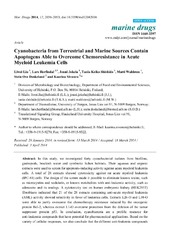| dc.contributor.author | Liu, Liwei | en_US |
| dc.contributor.author | Herfindal, Lars | en_US |
| dc.contributor.author | Jokela, Jouni | en_US |
| dc.contributor.author | Shishido, Tania Keiko | en_US |
| dc.contributor.author | Wahlsten, Matti | en_US |
| dc.contributor.author | Døskeland, Stein Ove | en_US |
| dc.contributor.author | Sivonen, Kaarina | en_US |
| dc.date.accessioned | 2015-04-28T08:30:14Z | |
| dc.date.available | 2015-04-28T08:30:14Z | |
| dc.date.issued | 2014-04-03 | eng |
| dc.identifier.issn | 1660-3397 | |
| dc.identifier.uri | https://hdl.handle.net/1956/9840 | |
| dc.description.abstract | In this study, we investigated forty cyanobacterial isolates from biofilms, gastropods, brackish water and symbiotic lichen habitats. Their aqueous and organic extracts were used to screen for apoptosis-inducing activity against acute myeloid leukemia cells. A total of 28 extracts showed cytotoxicity against rat acute myeloid leukemia (IPC-81) cells. The design of the screen made it possible to eliminate known toxins, such as microcystins and nodularin, or known metabolites with anti-leukemic activity, such as adenosine and its analogs. A cytotoxicity test on human embryonic kidney (HEK293T) fibroblasts indicated that 21 of the 28 extracts containing anti-acute myeloid leukemia (AML) activity showed selectivity in favor of leukemia cells. Extracts L26-O and L30-O were able to partly overcome the chemotherapy resistance induced by the oncogenic protein Bcl-2, whereas extract L1-O overcame protection from the deletion of the tumor suppressor protein p53. In conclusion, cyanobacteria are a prolific resource for anti-leukemia compounds that have potential for pharmaceutical applications. Based on the variety of cellular responses, we also conclude that the different anti-leukemic compounds in the cyanobacterial extracts target different elements of the death machinery of mammalian cells. | en_US |
| dc.language.iso | eng | eng |
| dc.publisher | MDPI | eng |
| dc.rights | Attribution CC BY | eng |
| dc.rights.uri | http://creativecommons.org/licenses/by/3.0/ | eng |
| dc.subject | Cyanobacteria | eng |
| dc.subject | Acute myeloid leukemia | eng |
| dc.subject | hepatocyte | eng |
| dc.subject | Apoptosis | eng |
| dc.subject | p53 | eng |
| dc.subject | Bcl-2 | eng |
| dc.subject | microcystin | eng |
| dc.subject | nodularin | eng |
| dc.title | Cyanobacteria from terrestrial and marine sources contain apoptogens able to overcome chemoresistance in acute myeloid leukemia cells | en_US |
| dc.type | Peer reviewed | |
| dc.type | Journal article | |
| dc.date.updated | 2015-04-08T13:19:33Z | en_US |
| dc.description.version | publishedVersion | en_US |
| dc.rights.holder | Copyright 2014 The Authors | |
| dc.identifier.doi | https://doi.org/10.3390/md12042036 | |
| dc.identifier.cristin | 1127117 | |
| dc.source.journal | Marine Drugs | |
| dc.source.40 | 12 | |
| dc.source.14 | 4 | |
| dc.source.pagenumber | 2036-2053 | |
| dc.subject.nsi | VDP::Medical sciences: 700::Clinical medical sciences: 750::Oncology: 762 | eng |
| dc.subject.nsi | VDP::Medisinske fag: 700::Klinisk medisinske fag: 750::Onkologi: 762 | nob |

